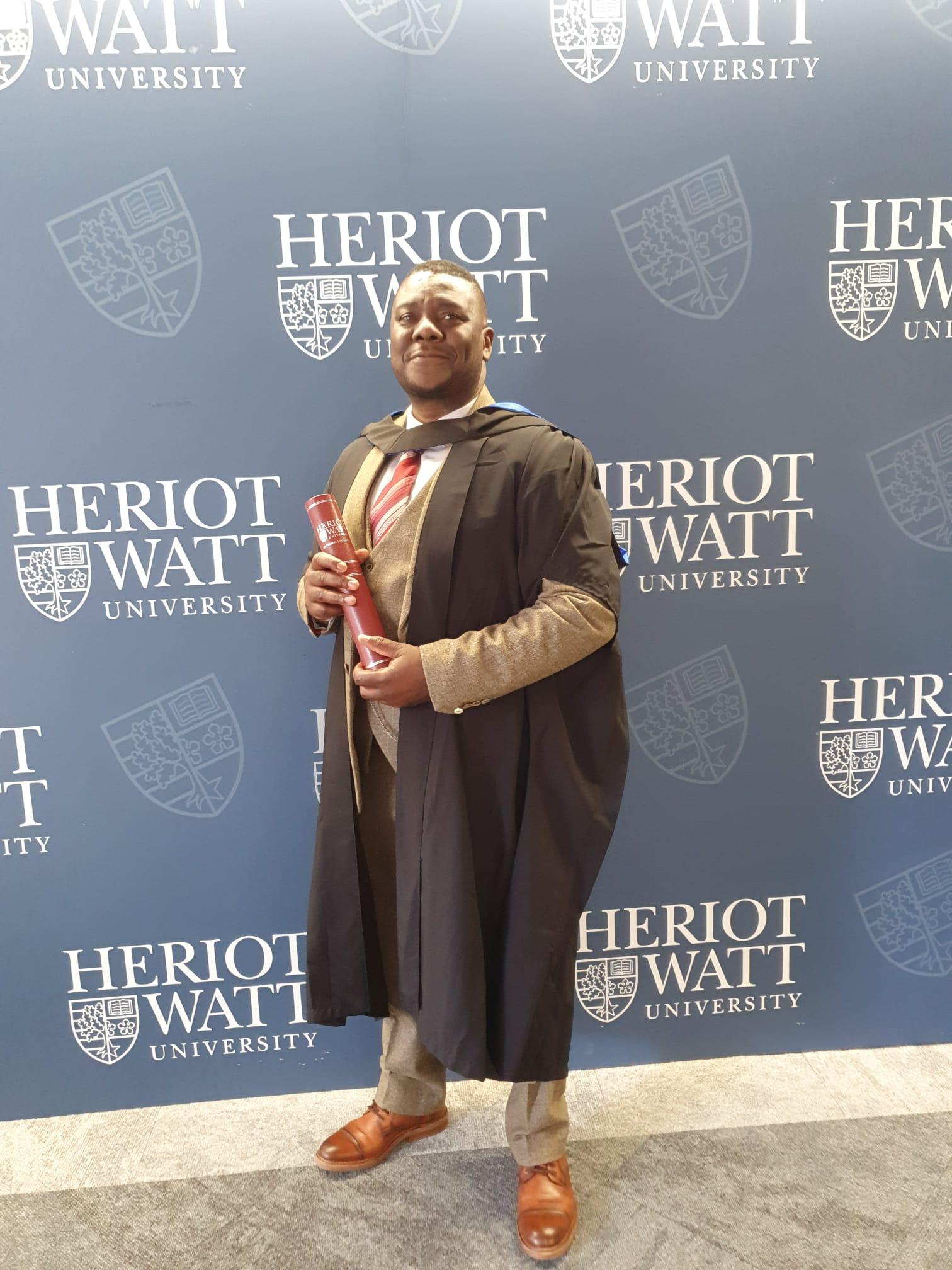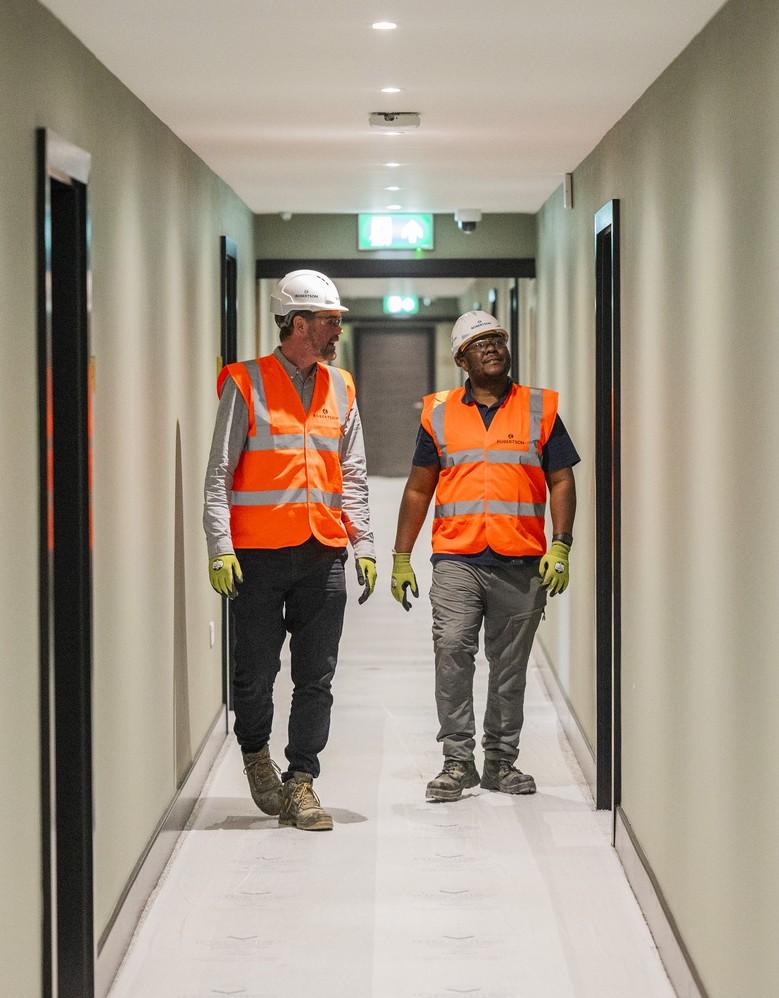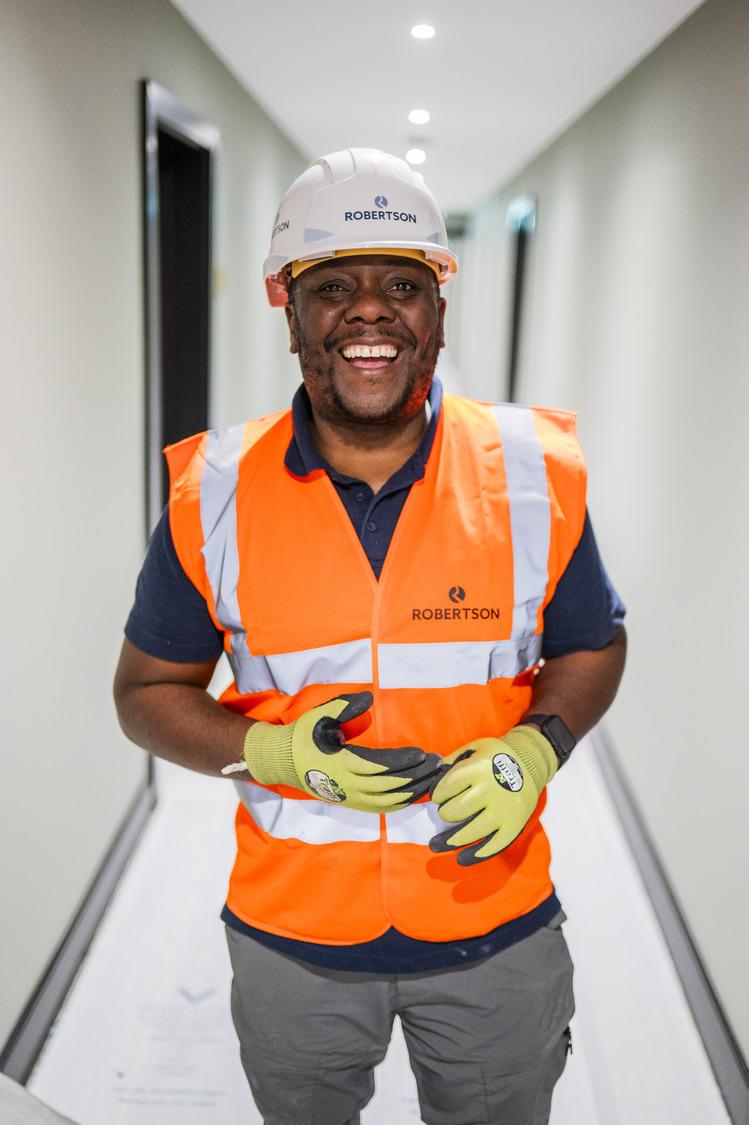
From the military to construction: Shadrech on transitioning to a civilian career
Across Team Robertson we have colleagues with a connection to the UK military – including cadets, reservists and veterans, along with family members of active and retired forces personnel. One such person is Shadrech, army veteran and now Assistant Site Manager with Team Robertson. Serving over a decade in The Royal Regiment of Scotland, Shadrech was medically discharged as the result of an injury sustained in Afghanistan. We spoke to him about his transition into a civilian career following active service, and his determination to give back.
Trained for the challenge
Shadrech, why choose the army as a career? There wasn’t much to it really, I was at a university jobs fair and the army stood out to me as an employer. I enjoyed fitness and looked on it as a way of doing that and getting paid. There were a few other attributes that drew me, for instance the discipline and being a team player.
I was a soldier in the infantry battalion. Things had kicked off in Afghanistan so that became the focus of training – it was essentially engrained in us that’s where we’d be going. By the time I was discharged I'd completed three operational tours along with field exercises in Kenya and Cyprus to prepare for the Afghan terrain and temperatures.
How did you adjust to being in Afghanistan? In the initial weeks of the first tour, it felt like a strange place to be. But I was there with my team, all the guys I had trained with and knew. Throughout our preparations, values like teamwork, leadership and honesty were instilled in us – and I truly felt I was among people I trusted with my life. The camaraderie really was immense, it was a great support system.
The prospect of a new career
In your third tour you suffered an injury which resulted in you being discharged? That was a tough time. I’d wanted to progress up the ranks and had been doing qualifications to help me get there. But once the doctors explained the extent of my injury, I understood why I wouldn’t be able to meet the physical demands of the job. Recovering did feel like getting a second lease of life though.
Did you feel prepared to move on after the army? Not really. In my case there was no support from the military – not even signposting – and that made things difficult. It’s a huge deal when you leave, you go from being part of an incredibly close team to finding yourself on your own. If there had been support and help, I know it wouldn’t have taken so long to get to where I am today.
When it came time to finding a job, what were your thoughts? With my infantry experience I could have gone into security, but I needed to rethink because of my injury. My plan was to be self-employed doing property maintenance, but after a while I realised it wasn't for me. However it did give me a sense of direction and I decided to do a degree in construction management – build properties rather than maintain them.
Aligning experience and skills
How was your time at university? When you’re in the army, you have to learn quickly so I had no problem adapting to the classroom or my studies at Heriot-Watt. I set out to learn as much as I could and that’s really where Robertson came into the picture. The Central East team had started on site for the construction of the National Robotarium, directly opposite the university. In effect I saw project progress from the get-go. I’d wander across to get a closer look and took the chance to speak to the Robertson team when they passed by. Through those conversations I learned more about Robertson as well as the project.
Tell us about joining Robertson: Towards the end of my degree I saw an Assistant Site Manager vacancy. From speaking to the Robotarium site team I knew that when it came to skills like teamwork, communication and safety, I had those in abundance from being in the army. Looking at the Robertson Way principles – listening, taking responsibility and being determined to succeed – it’s all I’ve ever known. Along with my degree qualification, that gave me the confidence to apply.
Starting on the job, I can’t say I knew all the technicalities around the build and I’ve been playing catch-up there. But things like the environmental, team building, communication and management aspects have never been a problem to me. And attention to detail is synonymous with being in the army, I can’t shake it off.

Settling into a civilian career
How would you describe your time at Robertson so far? It’s been incredibly positive and rewarding. From day one, I’ve felt supported by a strong team culture that values collaboration, learning, and accountability. It’s an environment where I can apply my skills and continuously develop new ones – particularly through working on live projects and ongoing CIOB chartership training.
My site colleagues are approachable and willing to share knowledge, which has really helped me settle into the role and build my confidence on site. Their insight is invaluable, especially when it comes to managing subcontractors, coordinating trades, and ensuring site safety and programme targets are met.
Coming from a background in both the military and facilities management, I’ve appreciated the clear communication, leadership opportunities, and the trust placed in me to manage daily site operations effectively. There’s a real sense of pride and purpose in what we build, and being part of a company that delivers projects to such a high standard makes the hard work feel worthwhile.
And the most enjoyable aspects of the job? I like how no two days are the same, it’s what I look forward to. And my team, I may be a manager but I’m also part of the team – that’s what I enjoy most.

Overcoming stigma and making a difference
You’ve spoken about the stigma attached to being a veteran, and experienced it yourself: When you’ve been to war it can undoubtedly impact your mental health. So when it comes to employment you’re often seen as a risk, not mentally stable and unpredictable. In another interview when I spoke about my past mental health, the panel were visibly uncomfortable. I didn’t get that job.
You recently started volunteering with the armed forces charity SSAFA: Yes, the charity provides welfare, health and support services including mentoring which I’ll be doing. I’ve completed my training and will soon be meeting with my first mentee. Providing this kind of support is important to you, tell us more about that: Being in the military, I was in one big family. But due to the right kind of support not being in place, eight of my friends took their own lives. I feel a real sense of responsibility and want to give back, even if it’s only to listen. I want to make a difference, go to one less funeral.
You’re also a Mental Health First Aider for Central East: Promoting good mental health is important to me. I come from an army background where you were told to man up and get on with it. In my role here I talk to people, I want to know how they’re doing and how their weekend went – really catch up with them. I remember doing my first mental health toolbox talk when I was on site at Moda, and the response was overwhelming. When you encourage people to talk and provide that space, it’s a release for anyone who’s been bottling things up – and that’s vital.

Finally, what advice would you give to a military veteran thinking about joining Robertson?
After more than a year with Robertson, I can confidently say it's a company that values discipline, teamwork, and commitment – qualities veterans already possess in abundance. My advice to any veteran thinking of making the move is this: be proud of your military experience, because it’s an asset here. The leadership, communication, and problem-solving skills we learn in the forces are directly transferable to construction.
Don’t be put off if you don’t have years of industry experience—Robertson supports growth and development. I’ve been encouraged to build on my strengths through ongoing training and chartership with CIOB. There’s a real culture of respect and teamwork, which reminded me of the camaraderie we had in service.
Reach out, ask questions, and don’t hesitate to start from where you are. Veterans bring a unique mindset to any team, and Robertson recognises that.
